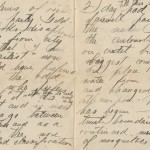Among the papers of Mary Mowbray Clarke included in the Sunwise Turn archive is Ms. Mowbray Clarke’s personal correspondence. The major portion of these letters span the years 1905–1917, from about the time she married John Mowbray Clarke up to the opening of the Sunwise Turn bookshop in partnership with Madge Jenison. A large portion of this correspondence was with her friends in the artistic and cultural community of New York in those early years of the twentieth century. A good number of these correspondents were public figures whose names are still recognized—Vachel Lindsay, Jerome Myers, Ezra Pound, Beatrice Wood—but others are essentially forgotten. One such person was the artist Howard Kretz Coluzzi.
Kretz Coluzzi was born in New York in 1876 or 1877 to Dr. F. Henry and Thekla Kretz. He was brought up in a cultured household in comfortable circumstances and first came to public attention in May 1899 when he jumped off the Brooklyn Bridge into the East River. Fished from the water by the crew of a passing boat, the 22- year-old National Academy of Design student told the magistrate at his hearing the following day that he couldn’t explain his jump but that he “felt sure I would not be injured and that I would come out all right.” He added that he’d previously made high jumps into Schroon Lake in the Adirondacks that had seemed more dangerous to him than this leap.
While Kretz Coluzzi continued to display eccentricities, along with, apparently, considerable artistic ability and a fair measure of ordinary human sociability, he never again attempted a feat of such bravado. Howard Kretz’s acquaintance with Mary Mowbray Clarke was probably a result of her husband’s role in presenting the 1913 Armory Show, at which Kretz Coluzzi exhibited. With the Mowbray Clarkes and Madge Jenison hard at work readying their shop for its late 1915 opening, Kretz Coluzzi pitched in with freely offered decorating ideas and practical woodworking skills.
The Sunwise Turn quickly became a springboard for another creative venture for the artist: the Lewisohn sisters’ Neighborhood Playhouse. Alice and Irene Lewisohn had been pupils, and eventually good friends, of Mary Mowbray Clarke, so Howard Kretz’s artistic association with the playhouse was, if not inevitable, at least not surprising. Kretz Coluzzi produced ideas for set designs for several productions at the playhouse between 1915 and 1919.
His theatrical work was significant and appreciated, notwithstanding his notable absence at a critical juncture during the preproduction of Lord Dunsany’s The Queen’s Enemies in 1916. When he finally showed up just before dress rehearsals, he explained his absence as having been provoked by the cutting down of his favorite tree on his mother’s estate. Years later Alice Lewisohn Crowley wrote, “This was the way Howard functioned. Still, this uncertain source contributed a spark to the family spirit and was as indefatigable in work as in mourning.”
At some point in the 1920s Kretz Coluzzi forsook New York, where he’d spent years commuting between Manhattan, with its cultural excitement, and the Adirondacks’ green solitude, for northern New Mexico. In Santa Fe he spent his last years drawing and painting, teaching (at least some of the time at the Santa Fe Art School), and engaging in various hijinks. He died on March 27, 1942 from an infected cat scratch.
Click on thumbnails to view larger images.
![Final page of letter of June 10, 1913, in which Howard Kretz mentions his fear that the resort camp’s cows will be “insulted [by his mother’s new fence] and tear down the fence because they are not allowed to tread the tennis courts to pieces.” He closes with his signature and a sketch of two presumably insulted cows. The letters in this 1913–1916 group are all signed “Howard Col Kr” or “Howard C K,” so his practice of identifying himself as Howard Kretz Coluzzi was evidently still in the future.](https://sites.utexas.edu/ransomcentermagazine/files/2015/02/Sunwise_Turn_17_5_002_edited-1.jpg)




![Final page of letter of June 10, 1913, in which Howard Kretz mentions his fear that the resort camp’s cows will be “insulted [by his mother’s new fence] and tear down the fence because they are not allowed to tread the tennis courts to pieces.” He closes with his signature and a sketch of two presumably insulted cows. The letters in this 1913–1916 group are all signed “Howard Col Kr” or “Howard C K,” so his practice of identifying himself as Howard Kretz Coluzzi was evidently still in the future.](https://sites.utexas.edu/ransomcentermagazine/files/2015/02/Sunwise_Turn_17_5_002_edited-1-150x150.jpg)